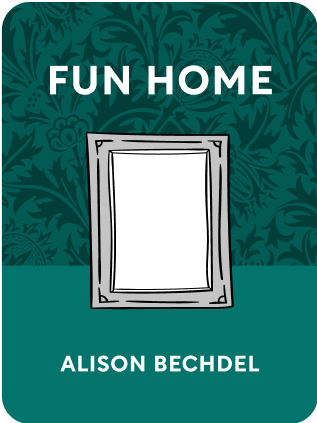

This article is an excerpt from the Shortform book guide to "Fun Home" by Alison Bechdel. Shortform has the world's best summaries and analyses of books you should be reading.
Like this article? Sign up for a free trial here .
What are the Fun Home themes present in Alison Bechdel’s graphic memoir?
There are several Fun Home themes in Bechdel’s book. Through her tumultuous relationship with her father, Alison explores gender identity, sexuality, death, and more.
Read more about the Fun Home themes and what they mean.
Fun Home Themes
These important Fun Home themes explore major ideas in the graphic memoir. Throughout the novel, Alison Bechdel learns about her father’s truth, and discovers her own. These Fun Home themes can help you bettre understand these themes.
Gender Identity
When Alison came out to her father, he didn’t seem upset. In fact, he encouraged her to explore while in college but didn’t want her to label herself a “lesbian.” In a letter he wrote to her shortly after she came out, her father talked as if she already knew about his sexuality. While he never directly said that he was gay or bisexual, he talked about how he thought about putting a label on his sexuality for years, but never did. He disclosed his envy of the “freedom” Alison and her contemporaries had to express their sexuality in the 80s.
When Alison returned home for the first time after coming out, her mother revealed many of her father’s transgressions. While sharing a bottle of wine, her mother explained the affairs her father had when they spent time in New York. She talked about his out-of-control behaviors such as shoplifting and speeding. She eventually told Alison of her plan to leave her father, a plan that Alison supported.
While home from school, Alison and her father went to see a movie. On the car ride to the theater, Alison asked her father if he gave her the Colette book as a way of reaching out about her sexuality. While he claimed that he didn’t, he said that he had his suspicions.
Then, Alison’s father opened up a little about his experiences with men. He said that his first time was when he was fourteen with a man at the Fun Home. He also said that he used to dress up in girl’s clothing, just like Alison used to dress up in boy’s clothing. Though the conversation didn’t delve any deeper, Alison felt as though they had finally discussed the unspoken bond they shared over their sexuality. They never discussed it again.
Sexual Repression and Openness
Sexuality is another of the Fun Home themes. Alison began to explore her sexuality in college. She checked out books from the library that discussed homosexuality and focused on the stories of lesbians. Her studies were both informational and erotic. She joined the gay union at her university and began dating her classmate, Joan.
Alison’s father was likely a closeted homosexual or bisexual man. Though he never directly expressed his sexuality to his family, Alison recognized a few behaviors that showed her father’s more feminine side throughout her childhood (such as his use of a bronzing stick). She implies that her father’s repression was a source of self-loathing and misplaced anger. She compares her father’s desire to create the image of a perfect home despite its disrepair to his desire to create the image of the perfect man despite his inner struggle.
Her father was sensitive to failure and disorder. He punished his children at any sign of imperfection, even if they hadn’t done anything wrong. For example, he once asked the family why a vase had gotten close to the edge of the table. No one responded, so he proceeded to grab and spank Alison as she cried that she hadn’t done anything.
Death
One of the Fun Home themes is death. One day, Alison’s father asked her to come to the room where he embalmed the bodies. On the table was a dead, naked man with his chest cut open. She was shocked to see the man’s genitals as well as his internal organs. Her father asked for a pair of scissors that he easily could have grabbed himself. She thinks that this was likely his attempt at eliciting an emotional response to death that he no longer felt.
Later in her life, Alison related to this as she coped with her father’s death. After he died, she would tell people of his passing in a matter-of-fact way to try to elicit an emotional response from them. This was her attempt to emote vicariously through someone else because she wasn’t feeling the sadness or grief that she thought she should be feeling.
Alison’s father died after he was hit by a truck while clearing brush from a home he was planning to renovate. The truck driver stated that Alison’s father jumped backward into the road as if he had seen a wild animal. Alison doesn’t know for sure, but she believes that his death was a suicide. She points to the facts that Alison’s mother had just filed for divorce and that her father had been reading literature that implied that life was meaningless.
Though Alison and her mother believed his death was deliberate, Alison mentioned later that perhaps her family chose to believe that because, to them, it was less painful. It gave her father agency over his own death. He chose when he wanted to die and went through with it.

———End of Preview———
Like what you just read? Read the rest of the world's best book summary and analysis of Alison Bechdel's "Fun Home" at Shortform .
Here's what you'll find in our full Fun Home summary :
- What it's like to grow up in a funeral home
- Why Alison Bechdel suspected her dad was a closeted homosexual
- Why Alison believes that her father's death may have been a suicide






